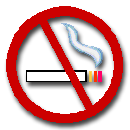Quitting Tips

When you have decided to set a quit date, make a plan. Just as you would not start out on a vacation without a road map, you need to have a plan ready for this important change in your life.
There are new medicines that can help take the edge off of withdrawal symptoms when you quit smoking.
- To replace some of the nicotine that you normally received with a cigarette, you can choose from a nicotine gum, a nicotine lozenge, a patch applied to your skin, a nasal spray or a nicotine inhaler. One form is not better than the other, it depends on what you prefer. The gum, lozenge, and patch are bought over the counter in most states, and the spray and inhaler require a physician’s prescription. The patch may be the easiest to use, since it is changed only once a day. It provides a continuous low dose of nicotine. While the other forms of nicotine replacement therapy offer a more immediate effect than the patch and are under your control, they require repeated uses throughout the day.
About eight to 12 weeks of nicotine replacement is recommended. Read the patient instructions for the correct way to use each of these products. Talk with your health care provider, especially if you are taking other medications or have a serious health problem.
- Another option is taking a smoking cessation medication, including Bupropion (Zyban) or Varenicline (Chantix). Both are pills that do not have nicotine in them but have been found to take away some of the desire for a cigarette. They work by blocking the pleasant effects of nicotine in the brain. These medications are taken for one week BEFORE you quit smoking, so that there is a good level of the medicine in your system when you do quit. At least seven to 12 weeks of medicine is usually recommended. A 2008 study in the American Journal of Health Behavior found that varenicline was more effective in quitting smoking than bupropion or a placebo. Discuss these medications with a physician, who will need to prescribe one for you.
Medicine alone, however, is not magic. You need to learn to handle urges to smoke and other ways to manage stress.
- Make a list of your five most important reasons for quitting cigarettes.
- Identify those times when you think the urge to smoke may be very strong.
- Can you avoid some of those situations for a few weeks?
If you cannot, think of several things you can do instead of smoking at those times. - Talk with your physician or health care provider about ways to stay smoke-free.
- Find a friend or family member who will support and encourage you during this very important change.
- Reward yourself for small successes, such as 24 hours of not smoking, and then one week of not smoking.
For More Information:
Do You Smoke? Do You Want to Quit?
Smoking – Tips on How to Quit (Medline Plus)
Tobacco Cessation – You Can Quit Smoking Now! (Office of the Surgeon General)
Tobacco Free Nurses
Reference:
Nides, M., Glover, E., Reus, V., Christen, A., Make, B., Billing, C. and Williams, K. (2008). Varenicline Versus Bupropion SR or Placebo from Smoking Cessation: A Pooled Analysis. American Journal of Health Behavior. 32(6): 664-675.
For more information:
Go to the Smoking and Tobacco health topic.
